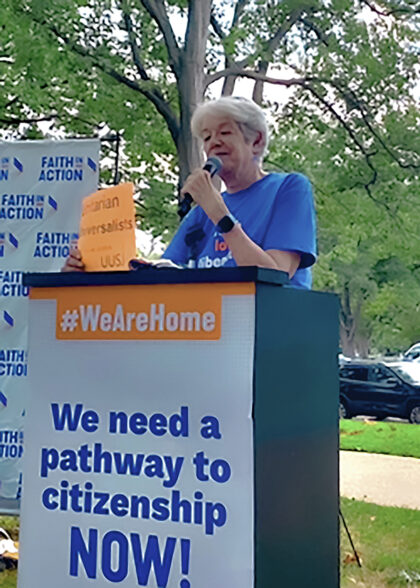 Charlotte Jones-Carroll, UUSJ Board Chair
Charlotte Jones-Carroll, UUSJ Board Chair
Private sector corporations are accountable to their owners – usually their shareholders. And governments are accountable to those they govern, usually voters. To whom are non-profit organizations accountable?
Some say it is to the stakeholders – anyone with an interest in the non-profit, such as beneficiaries of its services, donors, funders, vendors, board, and staff. From a Policy Governance perspective, a non-profit is accountable to its moral owners, who are part of its stakeholders.
Moral owners are the ones with whom a non-profit board decides what benefits the organization should produce, as part of its mission and vision. Owners are always stakeholders but not all stakeholders are owners.
UUSJ decided during its recent strategic planning effort that our moral owners are:
- UU individuals,
- UU congregations,
- Impacted people and
- Organizations representing (or led by) impacted people.
The first two might seem obvious. Historically UUSJ functioned as a network of congregations amplifying UU voices and justice-based practices. Further, almost all our funding comes from donations from UU individuals or congregations and grants from the UU Funding Program.
Yet, it became clear as we discussed this that our policy priorities are related to justice for people way beyond our UU universe. We want to center the needs and views of impacted people in making our advocacy decisions. Our policy priorities call us to speak on behalf of immigrants and refugees, persons denied full voting rights, people affected by environmental damage, and those who suffer systemic inequalities. To speak authentically on behalf of these moral owners, we must be in relationship with and accountable to them and their organizations.
As a result, UUSJ is re-doubling our efforts to partner with such organizations and to listen carefully to the people most impacted. We are also continuing to survey UU individuals. We see collaborative opportunities for justice where our commitment and mission align — such as when we join in coalition work. We are also looking for more ways to include those impacted directly in our advocacy work. One example is including immigrants with Temporary Protected Status (TPS) or Deferred Action for Childhood Arrivals (DACA) in our meetings with lawmakers on pathways to citizenship.
Accountability is a relational concept – UUSJ works in a social and institutional setting. There is internal accountability – the Executive Director reports to the Board of Trustees, and the staff and volunteers report to the Executive Director. Then there is external accountability to our funders and to our members (UUSJ highly values its individual and congregational members).
In addition and mainly – we are accountable to the people on whose behalf we strive to speak and act. If we are truly pursuing justice, we owe faithful stewardship to all our moral owners.
This means working our way through competing and often conflicting views about the right path. The “big tent” of Unitarian-Universalism guarantees that we will have UU moral owners with differing views. This becomes even more of a major balancing act when we add the diverse views of impacted people we seek to align with on federal legislation and policies.
The ideal laws we want to see passed rarely have a chance in Congress these days. So UUSJ’s action teams do research, listen to impacted people, hold town halls and webinars and consider views of other faith partners working in the same policy areas. Then we decide where and how to join in petitions, public comments, demonstrations, and Capitol Hill advocacy.
At best, we define a clear path for advocacy on a particular issue based on our understanding of the policy goals of people affected by that issue and of UUs, as well as how far they are willing to compromise to assure that the ideal does not drive out the good. Progress may be incremental rather than transformative, but it can still move things forward.
We strive constantly to check our accountability so that the progress we achieve toward our vision is always connected to our UU Principles, our commitment to justice, and our understanding of the urgency and harm experienced by all our moral owners.

